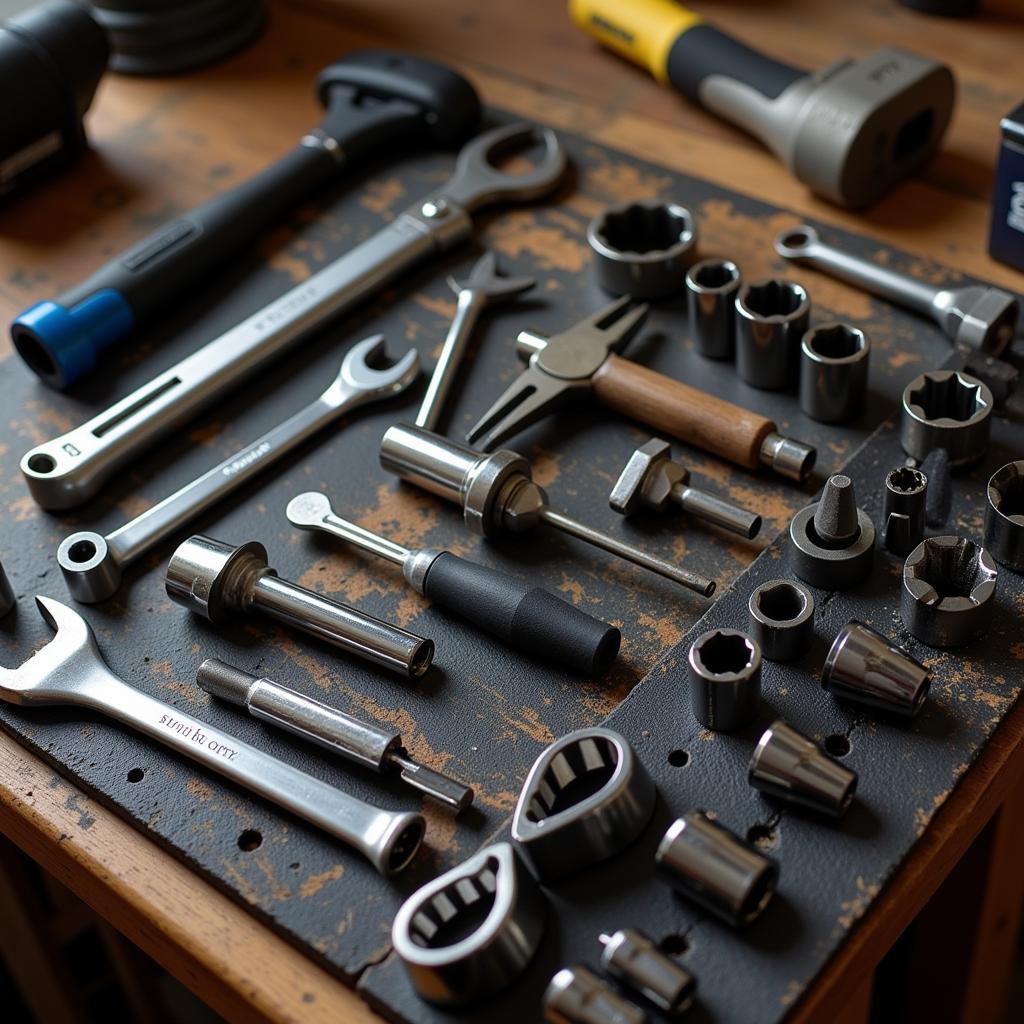Want to fix your car yourself? Knowing the right tools to buy is the first step. Having the correct tools not only makes repairs easier but also safer and more efficient. This comprehensive guide will walk you through the essential tools any aspiring DIY mechanic needs.
Basic Hand Tools: Your First Arsenal
Every car owner should have a basic set of hand tools. These are your go-to for simple tasks like changing a tire, replacing a battery, or tightening loose bolts. This foundational toolkit includes:
- Screwdrivers: A set of Phillips and flathead screwdrivers in various sizes is crucial. Invest in good quality screwdrivers with magnetic tips to prevent dropped screws.
- Wrenches: Both metric and standard wrench sets are essential, especially combination wrenches which offer both open-end and box-end options.
- Pliers: Needle-nose pliers, slip-joint pliers, and locking pliers (often called Vice-Grips) are invaluable for gripping, bending, and cutting wires or small parts.
- Socket Set: A comprehensive socket set with various sizes and extensions will allow you to tackle a wider range of bolt and nut sizes, especially in tight spaces.
- Hammer: A standard claw hammer is useful for various tasks, from tapping parts into place to removing stubborn components.
 Basic Hand Tools Set for Car Repair
Basic Hand Tools Set for Car Repair
Do you need help finding the best car tool brand? Check out our comprehensive guide!
Diagnostic Tools: Uncovering Hidden Problems
Modern vehicles rely heavily on electronics. Diagnostic tools help you understand what’s happening under the hood without needing a mechanic’s expertise.
- OBD-II Scanner: This tool plugs into your car’s diagnostic port and reads error codes, giving you insights into potential problems. Many affordable options are available, offering varying levels of functionality.
- Multimeter: A multimeter measures voltage, current, and resistance, helping you diagnose electrical issues. This is essential for troubleshooting problems with the battery, alternator, or wiring.
Are you searching for car opening tools amazon? Explore our recommended list.
Tools for Specific Tasks: Going Beyond the Basics
Depending on your DIY ambitions, you may need specialized tools for specific repairs.
- Jack and Jack Stands: These are essential for lifting your car safely to work underneath it. Never work under a car supported only by a jack.
- Torque Wrench: This tool ensures you tighten bolts to the correct specifications, preventing damage to sensitive components.
- Brake Bleeder Kit: If you’re planning to work on your brakes, a brake bleeder kit is essential for removing air from the brake lines.
- Impact Wrench: For removing stubborn lug nuts or other tightly fastened bolts, an impact wrench can be a lifesaver.
Looking for good customer care service tool? We have reviewed some of the best options available.
Choosing the Right Tools: Quality over Quantity
Investing in quality tools is crucial. While cheaper tools may seem appealing, they are often less durable and can break easily, leading to frustration and potential injury. Choose tools made from durable materials like chrome vanadium steel and with comfortable handles for a better grip. Remember, buying good tools is a long-term investment.
Conclusion: Equipping Your DIY Workshop
Having the right tools empowers you to tackle car repairs confidently. By starting with a basic set and gradually adding specialized tools as needed, you’ll be well-equipped to handle many common car maintenance tasks. Remember to prioritize quality tools to buy if you want to fix your car effectively and safely.
FAQ
- What is the most important tool for a beginner DIY mechanic? An OBD-II scanner is a great starting point as it helps understand the car’s issues.
- Do I need both metric and standard wrenches? Yes, many cars use a mix of both metric and standard fasteners.
- How do I choose a good quality tool? Look for tools made from durable materials like chrome vanadium steel and with comfortable handles.
- Is it worth investing in an impact wrench? Yes, if you frequently work on removing tightly fastened bolts.
- What safety precautions should I take when working on my car? Always use jack stands when working under a car and wear appropriate safety gear.
- Where can I find reliable information on car repairs? Online resources and repair manuals specific to your car model are helpful.
- How do I know the correct torque specifications for my car? Refer to your car’s repair manual or online resources.
Common Scenarios and Questions
- Scenario: Check engine light is on. Question: How can I diagnose the problem? Use an OBD-II scanner to read the error codes.
- Scenario: Flat tire. Question: What tools do I need to change it? Jack, jack stands, lug wrench, and spare tire.
- Scenario: Dead battery. Question: How do I test the battery and alternator? Use a multimeter to check the voltage.
Further Exploration
For more in-depth information on buying and selling cars online, check out our guide on the best car sale online tools. You might also be interested in comparing different car models with our car and driver comparison tool.
Need assistance? Contact us via WhatsApp: +1(641)206-8880, Email: [email protected], or visit us at 910 Cedar Lane, Chicago, IL 60605, USA. Our customer service team is available 24/7.